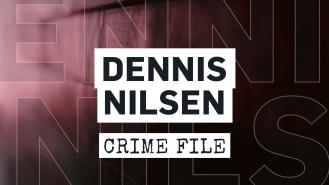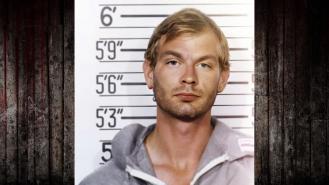
"The Muswell Hill Murderer"
Dennis Nilsen killed, defiled and dismembered 15 young men between December 1978 and February 1983, practically under the noses of his neighbours. When police finally arrested him in 1983, it quickly became apparent that, had they linked a series of reported incidents from lucky escapees over the previous five years, they might well have halted his ghoulish killing spree considerably sooner.
Dennis Nilsen was born on 23 November 1945 in Fraserburgh, Scotland. His parents' marriage was an unhappy one and, as a result he lived (along with his mother and siblings) with his maternal grandfather, whom Nilsen adored. Nilsen claimed that his beloved grandfather’s unexpected death, when he was just six years old, and the traumatising viewing of his corpse at the funeral, led to his later behavioural psychopathology.His mother went on to remarry and have four more children, leaving Nilsen a withdrawn and lonely child. Aware of his homosexual attractions, he claimed no sexual encounters as an adolescent and, aged sixteen, he enlisted in the army. He became a cook, serving as a butcher in the Army Catering Corps, learning the skills that served him so well during his five-year killing spree
On leaving the army in 1972 he took up police training, where he discovered a fascination for morgue visits and autopsied bodies. Despite the obvious advantages that police work gave to develop his morbid tastes, he resigned and went on to become a recruitment interviewer.
Nilsen’s first official brush with the police came in 1973. David Painter, a young man whom Nilsen had met through his work, claimed that Nilsen had taken pictures of him while he was asleep. Painter was so incensed that he required hospitalisation as a result of their confrontation. Nilsen was brought in for questioning about the incident, but was subsequently released without charge.
In 1975, he took up cohabitation with David Gallichan in a garden flat situated at 195 Melrose Avenue, in North London, although Gallichan denied that they had a homosexual relationship This lasted two years and, when Gallichan left, Nilsen’s life began a downward spiral into alcohol and loneliness, that culminated in the first murder 18 months later.
Timeline
Born 23 November 1945The Victims 30 December 1978 - Unidentified 3 December 1979 - Kenneth Ockenden 13 May 1980 - Martyn Duffey, 16 Date uncertain - Billy Sutherland, 27 18 September 1981 - Malcolm Barlow, 24 December 1981 - John Howlett Date uncertain - Archibald Graham Allan 23 January 1983 - Steven Sinclair, 20(Admitted to killing 15 victims in total, between December 1978 and February 1983, but eight were never identified.)Arrested 9 February 1983Trial 24 October 1983Convicted 4 November 1983
The Trial
justice at last
His trial commenced on 24 October 1983. Nilsen was charged with six counts of murder and two charges of attempted murder. He pleaded “Not Guilty” to all charges, citing diminished responsibility due to mental defect.The prosecution relied primarily on the extensive interview notes that resulted from his arrest, which took over four hours to read verbatim to the jury, as well as the testimony of the three victims, Paul Nobbs, Douglas Stewart, and Carl Stotter, who had managed to escape, all of whom he had attempted to strangle.Despite attempts by Nilsen’s defence to undermine the testimony of these victims, by introducing evidence of their sexual encounters with Nilsen, their harrowing accounts inflicted serious damage on the defence case.
Physical evidence included photographs of the murder scenes, as well as the chopping board used to dissect the victims, and the cooking pot used to boil the skulls, feet and hands (which is now on display at the Black Museum at Scotland Yard).The defence case relied primarily on the testimony of two psychiatrists, Dr. James MacKeith and Dr. Patrick Gallwey. MacKeith described Nilsen’s troubled childhood, inability to express feelings, and the resulting separation of mental function from physical behaviour, which affected his own sense of identity, and implied an impaired responsibility on the part of Nilsen. Under intense cross-examination by the prosecution, however, MacKeith was forced to retract his judgement about diminished responsibility.The second psychiatrist, Gallwey, diagnosed Nilsen as suffering from a “False Self Syndrome”, characterised by outbreaks of schizoid disturbances which made him incapable of premeditation, but most of his testimony was extremely technical, even giving the judge cause to question Gallwey’s complex diagnosis.The prosecution called Dr Paul Bowden as rebuttal psychiatrist who had spent considerable time with Nilsen, finding no evidence for much of the testimony put forth by the defence psychiatrists. He stated that Nilsen was manipulative, with some signs of mental abnormality, but nevertheless still cognisant of, and responsible for, his actions.During the summing up, the judge dispensed with the majority of the psychiatric jargon that had perplexed the jury, by instructing them that a mind can be evil, without being abnormal.The jury retired on 3 November 1983, but were unable to reach a unanimous verdict. The following day, the judge agreed to accept a majority verdict and, at 4.25 p.m., they delivered a verdict of “Guilty” on all six counts of murder.The judge sentenced Dennis Nilsen to life in prison, without eligibility for parole for at least 25 years.
The Arrest
"Something smells off"
Nilsen was met on the evening of 9 February 1983 by Detective Chief Inspector Jay, who informed him that they wished to question him in relation to the human remains that had been discovered in the drains. On entering the flat, Jay noticed the pervasive foul odour, and asked Nilsen what it was, at which point he calmly confessed that what they were looking for was stored in bags around the flat, which included two dismembered heads and other larger body parts.Upon his arrest, he immediately provided exhaustive details about his killing spree, admitting to killing 15 young men, despite receiving a legal caution. He also admitted to the attempted murder of seven others, although he could name only four of them. At no point did he show any remorse, and appeared eager to assist the police with amassing evidence against him, even taking them to his old address to point out specific disposal details.After the confession, Nilsen was held at Brixton Prison pending trial. Whilst there, he wrote over fifty notebooks of his memories to assist the prosecution, and also drew what he referred to as “Sad Sketches” which detailed his treatment of some of his victims. He seemed ambivalent about his fate, at turns without remorse, and then showing concern about public attitudes towards him. He fired his legal council, then rehired him, and fired him once again, shortly before he came to trial.
The Crimes
A disturbed individual
Nilsen became increasingly disturbed by his sexual encounters, which only seemed to reinforce his loneliness when they were over. He met his first young victim in a pub on 29 December 1978, and invited him home, as he had on previous occasions. The next morning, overcome by a desire to prevent the man from leaving, he first strangled him with a tie, before drowning him in a bucket of water. Taking the corpse to his bathroom to wash it, he then placed it back in his bed, later remarking that he found the corpse beautiful. He attempted to have sex, unsuccessfully, then spent the night sleeping next to the dead man. He finally hid the corpse under his floorboards for seven months, before removing it and burning the decaying remains in his back garden.Nilsen’s second brush with the police came in October 1979, when a young student accused Nilsen of trying to strangle him during a bondage-play session. Despite the student’s claims, no charges were laid against Nilsen.Nilsen encountered his second victim, Canadian tourist Kenneth Ockendon, at a pub on 3 December 1979. Following a day of sightseeing and drinking, which ended at Nilsen’s flat, Nilsen again succumbed to his fears of abandonment and strangled Ockenden to death with an electrical cable, before cleaning up the corpse as before, and sharing a bed overnight. He took photos, engaged in sex and finally deposited the corpse under the floorboards, removing it frequently and engaging in conversation, as if Ockenden were still alive.His third victim, some five months later, was Martyn Duffey, a homeless sixteen-year-old, who was invited to spend the night on 13 May 1980. As with his first victim, Nilsen strangled then drowned him, before bringing him back to bed and masturbating over the teenager’s corpse. Duffey was kept in a wardrobe for two weeks, before joining Ockenden under the floorboards.
His next victim was rent boy Billy Sutherland, aged 27, who had the misfortune of following Nilsen home one night. He too was strangled.Malcolm Barlow, 24, was an orphan with learning difficulties, who was soon despatched by strangulation.By 1981, Nilsen had killed twelve men in the flat, of whom only the above four could be identified which, given his penchant for preying on the homeless and the unemployed in a large city, is probably less surprising than it might be in a smaller community.Nilsen claimed he went into a “killing trance,” and on seven occasions, actually freed the men rather than complete the act, because he was able to snap out of it. The majority of his victims weren’t so lucky.By the time Malcolm Barlow was killed, Nilsen was forced to stuff him under the kitchen sink, as he was rapidly running out of storage space, what with half a dozen bodies secreted around the flat. He was forced to spray his rooms twice a day, to be rid of the flies that were hatched from the decomposing bodies. When neighbours complained about the smell, he convinced them they stemmed from structural problems with the building.To get rid of the corpses, he would remove his clothing and dismember them on the stone kitchen floor with a large kitchen knife, sometimes also boiling the skulls to remove the flesh, also placing organs and viscera in plastic bags for disposal. He buried limbs in the garden and in the shed, and stuffed torsos into suitcases until he could burn the remains in a bonfire at the end of his garden. On occasions he would burn fires all day, without raising any suspicion from neighbours. He generally crushed the bones once the fire had consumed the flesh, and police found thousands of bone fragments in the garden during later forensic examinations.In 1982, in a desperate attempt to stifle his homicidal behaviour, Nilsen moved into a top-floor flat at 23 Cranley Gardens, Muswell Hill, also in North London, which had no garden and no convenient floorboards. Still unable to quell his impulses, a further three victims were killed in this flat between his arrival and February 1983. These victims were identified as John Howlett, Archibald Graham Allan and Steven Sinclair, and presented Nilsen with much greater disposal challenges, given the flat’s lack of direct access outdoor space. He overcame these by boiling the heads, feet and hands, and dissecting the bodies into small pieces that could be flushed down the toilet, and disposed of in plastic bags.There were five other tenants at Cranley Gardens, none of whom knew Nilsen very well and, in early February 1983, one of them called out Dyno-Rod, the drain specialists, to investigate a drain blockage. In the presence of the tenants, including Nilsen, the technician discovered rotting human remains when he descended via the outdoor manhole, and it was decided that a full inspection would be conducted the next day, after which the police would be called in to investigate. Nilsen, increasingly aware of the prospect of capture, tried to cover his tracks by removing the human tissue from the drains that night, but was spotted by the downstairs tenant, who became suspicious of his actions. It was reported that, on the morning of 9 February 1983, he told a work colleague laughingly: “If I’m not in tomorrow, I’ll either be ill, dead or in jail.”

